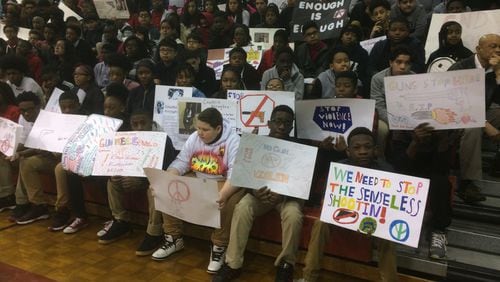Beck Glover from Coweta County did not plan to walk out of class Wednesday to memorialize 17 killed in February mass shooting at a Florida high school.
It’s not that he isn’t horrified by what happened.
The issue is that the protest movement for many metro Atlanta teenagers has a decided bent toward demanding new gun control laws -- from signs local students were holding to politicians seizing the issue in their expressions of what the day was about.
Like a sizable segment of Georgians, Beck doesn't see guns as the problem. His experiences with guns are positive. The 16-year-old grew up hunting with his grandfather and father. He not only plays on the Newnan High School lacrosse team, he also target shoots competitively as a part of a popular Georgia 4-H program.
MORE | Live updates: Ga. students walk out against gun violence
MORE | Cobb students say they must walkout of Walton despite discipline
Beck has talked to students on all sides of the issue, but says most of people he hangs out with in the rural edge of southern Coweta County have opinions nearer to his as opposed to those leading the walkouts in urban Atlanta.
“I kind of think that the focus of the movement overall doesn’t need to get political,” he said.
He might participate in a memorial service organized by the principal at his school, he said Friday night.
But, “Students walking out ought not to use the pain and suffering…for the political side of what they want to carry through.”
The segment of Georgians who share experiences like the Glover family’s is sizable.
More than 4,000 students participated in 4-H’s shooting training and competitions in the last year, and about 6,000 young people take Georgia’s hunter safety course yearly. Throw in high school and JROTC shooting teams and other competitions and groups like the Boy Scouts, and there could be more than 100,000 students across the state who have training experience with guns, said Walter Lane, the DNR’s Hunter Development Program Manager.
More 600,000 Georgians of all ages buy hunting licenses yearly, according to DNR numbers.
Across the country, about one in three Americans polled by Pew Research Center admitted to owning guns. The caveats are that it is difficult to get an accurate count on gun ownership, and that the percentage is likely higher in more rural and more politically conservative areas.
In the Georgia countryside, guns have been a handy tool for putting food on the table and protecting livestock and family since the first European settlers. It’s woven, warp and weft, into the farm-side fabric of life. In urban areas, where many people’s exposure to guns is too often because of news of shootings and carjackings, ownership can be more about personal safety. Some take up guns in anticipation of dire need. Others, such as Wade Cummings, the co-general manager of the Georgia Gun Club in Buford, take them up after.
“I never touched a gun until 2007,” the 50-year-old Cummings said. “In 2006, two weeks before Christmas, my wife and I had been living in a home on Lake Lanier and were the victims of a violent home invasion. I was not prepared for it. We had two small children, and it changed my life and the trajectory of my career.”
RELATED | Teens find political voices after latest school shooting
RELATED | ACLU of Georgia advocates for student punished for school walkout protest
The regional sales manager said he realized he was the final line of protection for his family. He left his job behind and spent a year training and pursuing certifications as a trainer in firearms use. Now, he helps train over 500 students a year at the club.
Cummings expressed a sentiment commonly heard among those who own guns and are concerned about restrictions of gun owner rights.
“We are talking about this not because firearms exists in the world. We are talking about this because evil exists,” he said.
Good people must defend themselves, he said.
“Violent crime is only feasible if victims are disarmed or are cowards. A victim who fights back makes the whole business impractical.”
Like the younger Glover, he is sympathetic to the victims in Florida. He knows what it is to be a victim. But he thinks directing the anger at inanimate guns is a mistake.
“I think it’s perfectly OK with me if children and adults want to collectively get together and take some time and come together and say we are going to take 30 minutes for silence, or whatever, and remember these people, because this didn’t have to happen.…We should remember them and honor their families.….and all of that is outside of any political ideology. This is just us loving each other when it hurts.”
Roy “Buzz” Glover, the father of 16-year-old Beck, reflects the thoughts on both sides of the political spectrum as he talked about the need to push for changes on issues such as mental health and making sure authorities take decisive action, when they get information like Florida authorities had on the former student there who is charged with the murders. But there is a clear dividing line between him and the other side when it comes to gun control laws.
Glover, an engineer, said he could agree perhaps to making bump stocks, which effectively turn military-style rifles into a fully automatic machine guns, more difficult to buy. But upping the age to buy a rifle or shotgun from 18 to 21? Eighteen and 19 year olds are trained in the military to use automatic weapons, he said. But they can’t buy a rifle to go hunting when they are home? Doesn’t make sense.
There are political dividing lines on the issue that seem to be unbridgeable.
“It’s one of a handful of really polarizing issues that’s been out there for a long time,” Glover said.
But tightening background checks and dealing with the mental health issues will bring the sides of the chasm a bit closer together. It won’t be easy to find a middle ground, but there is hope. But it will be a long process.
“Not that there won’t be some dissatisfied on both side,” he said.







